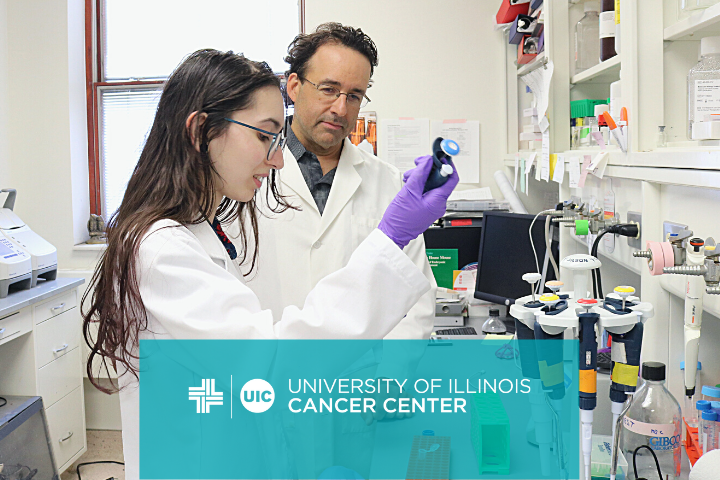
A 10-week research internship with University of Illinois Cancer Center members this summer could lead to a lifetime of scientific discoveries.
Beginning in May, four underrepresented students from the University of Illinois Chicago and transfer students from Malcolm X College, one of the City Colleges of Chicago, will participate as biomedical researchers on projects involving cancer biology and/or population health studies through the Bridges to Baccalaureate grant, part of the National Institutes of Health’s Maximizing Access to Research Careers (MARC) T34 program. A five-year, $1.2 million grant will support undergraduate students training in biomedical research during the last two years of their studies.
UIC students who have completed their junior year have the opportunity to engage in one-on-one mentoring with Cancer Center members, said Paul Grippo, UIC associate professor of medicine, associate director of career enhancement and education at the Cancer Center, and project co-principal investigator. The opportunity affords trainees the ability to develop skills in basic or population science while learning the entire process of conducting research projects.
“Though the program is for 10 weeks, we anticipate students to have a longer term interaction with Cancer Center mentors,” Grippo said. “Students will engage in community efforts and partnerships to better establish research that impacts all people, particularly those with high cancer healthcare disparities. Trainees will assist their mentors in identifying disparities within their own research and develop courses of action to resolve these inequities.
“All of these objectives fit within the Cancer Center’s mission and serves to expand necessary detection and treatment efforts, including clinical trials, to the underserved and underrepresented. Achieving these goals is directly in line with the Cancer Center’s strategic plan.”
About 20 faculty members from the Cancer Center and multiple UIC colleges have expressed interest in participating as mentors. One student has fully committed to join a Cancer Center member’s lab, with additional students soon to follow, Grippo said.
“The students are very excited about this unique hands-on educational platform, and agree that such an experience will further advance their academic and career ambitions,” he said. “Having a strong increase in underrepresented trainees progressing into advanced degrees and beyond will serve well in diversifying the biomedical/cancer workforce. Ultimately, this will best represent the UI Health population and establish stronger ties of trust between patients and medical care providers, particularly those focused on care of individuals with cancer.”
